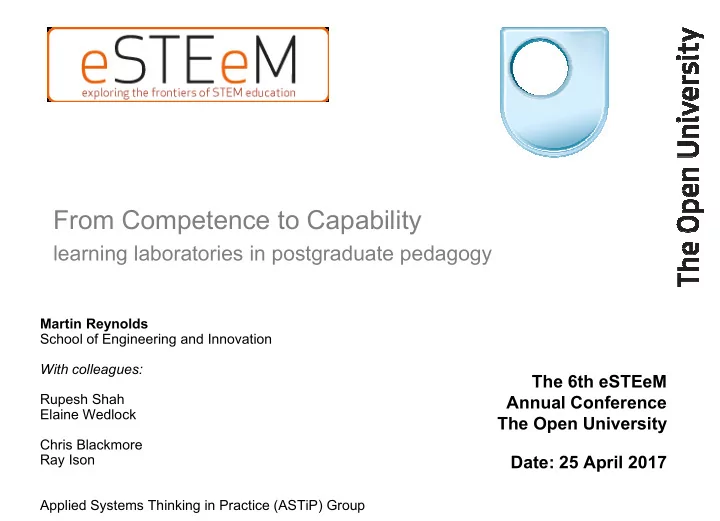

From Competence to Capability learning laboratories in postgraduate pedagogy learning laboratories in postgraduate pedagogy Martin Reynolds School of Engineering and Innovation With colleagues: The 6th eSTEeM Rupesh Shah Annual Conference Elaine Wedlock The Open University Chris Blackmore Ray Ison Date: 25 April 2017 Applied Systems Thinking in Practice (ASTiP) Group
Overview • Developing capacity: final report of an 18-month eSTEeM project - Enhancing Systems Thinking in Practice (STiP) at the Workplace – completed in 2016. • Capacity building at the OU: competency and capability? • Teaching systems thinking (in practice) competency • Coaching systems thinking in practice capabilities • Learning laboratories for developing competency framework • Learning laboratories for developing effective capabilities
eSTEeM project: Enhancing systems thinking in practice (STiP) in the workplace (an alternative pathway of partnership for postgraduate curriculum development) 4 phases of systemic inquiry January 2015 to August 2016 (c.18 months) • Phase 1: Understanding existing PG situation of students (x10 interviews and x1 group of students (x10 interviews and x1 group follow-up video-conference meeting) • Phase 2: Engaging with STiP alumni group and employers; feeding back on phase 1 (c.x16 interviews) • Phase 3 : Developing systemic model of retention and recruitment (workshop) • Phase 4: Dissemination – Working papers – Conference papers – Platform bid for wider systemic inquiry
Phase 3: some recommendations from eSTEeM project • co-design learning system with employers and alumni • explore use of twitter and other social media for facilitating peer conversations • • promote workplace coaching with employers of STiP alumni promote workplace coaching with employers of STiP alumni • explore partnership ideas with conventional HEIs and social enterprises on f2f complementarities ( blended leaning ) • design modules customise-able for professional development ( bespoke short courses) • develop professional recognition of STiP through a competency framework PG Certificate, Diploma or Masters eSTEeM phase 2: ‘Competency’ in relation to ‘capacity’ and ‘capability’? in Systems Thinking in Practice
Capacity building Unique features of OU: ‘third mission’ Student First…OURedesign Capacity Building? Research Teaching REF TEF
Capacity building with STiP HEIs limited to developing competencies…. “Investment in systems literacy [ competency ] and then systems thinking in practice capability is missing in education as well as organizational life. “The shift from sensibility [ capacity ] to capability is needed if purposeful action is to be pursued with some prospect of altering the current and anticipated human condition …” “This is the challenge of ‘Governing the Anthropocene’ which […] is also the greatest challenge for systems thinking in practice…” (adapted from) Ison, R. and Shelley, M., (2016). Governing in the Anthropocene: Contributions from Systems Thinking in Practice? Systems Research and Behavioral Science, 33(5), pp.589-594.
From ‘competencies’ to ‘capabilities’ 2-year eSTEeM action research inquiry Three significant challenges in Higher Education that hinder systems thinking 1.entrenchment of existing disciplinary boundaries 2.pedagogic traditions that fail to engage learners’ existing work experiences 3.institutional assessment strategies based on summative as against more formative or developmental evaluation Some core capability challenges with STiP 1. ‘Transdisciplinarity’ developing praxis support 2. ‘Silent practice’ cultivating harmonious adaptive practices 3. ‘Experimentation’ enabling safe-fail spaces
Coaching systems thinking in practice capabilities Two emergent action research activities Developing effective learning laboratories for capability enhancement Two action research co-inquiry endeavours …2017 1. Nurturing a ‘learning laboratory’ on a STiP competency framework for better external recognition and legitimacy of skills needed for integrated/ harmonious interventions… (eSTEeM - 2 inquiry) – Phase 1: capturing insights from key Systems practitioners – Phase 2: engaging perspectives exploring systemic desirabilities and – Phase 2: engaging perspectives exploring systemic desirabilities and cultural feasibility of STiP competency framework (online virtual conference sessions) – Phase 3: workshop support (f2f) in modelling STiP framework 2. Developing a ‘learning laboratory’ specific for supporting practitioners involved with implementation of SDGs. Research work with UNDP…
Learning laboratory-2 Supporting capabilities for SDG implementation (SDG 17) • OU tradition: Third Mission (teaching + research +) work of The Open University as HE provider… ‘outreach’/ social and community development • ASTiP tradition: academics working with practitioners in supporting health care, environmental management, local communities, indigenous community groups etc. in co-inquiry endeavours • ASTiP ‘Learning labs’ provide interactive space, support (tools, methods, concepts, experiences), and facilitation in (re) framing public policy issues and devising action strategies for research, education, and decision making. UNDP and OU partnership OU resources: Open Media Unit 1. Meeting the challenge of 1. FutureLearn MOOCs (massive open SDG 17 online courses): platforms for social learning (OU-lead consortium) 2. Drawing on experience of systems thinking in practice 2. OpenLearn Create (Works) platform and development policy and for designing interactive learning practice (DPP) practitioners UNDP – OU MOOC-Plus initiative Two components 1. MOOC - core: 4 week course (12 hours total) based on core principles of STiP competences 2.MOOC – wrap around: series of additional bespoke (closed) learning spaces enabling specific engagement amongst stakeholders
Learning laboratories with UNDP support Systems thinking laboratory for SDG implementation Two components MOOC –Plus. 1. MOOC - core: 4 week course (12 hours total) based on core principles of STiP competences 2. MOOC – wrap around: series of additional bespoke (closed) learning spaces enabling specific engagement amongst stakeholders
Challenges • Provide a safe-fail environment: move beyond supporting competencies to supporting capabilities • Secure involvement of ALs and their own institutional contexts • Secure involvement of OU alumni (as advisors/mentors) • Secure involvement of employer-partners • Reconfigure PG course production and provision (changing role of educators as gatekeepers to facilitators and co-learners) • Change marketing ethos from supply-driven (inside-out) to demand-pull (outside-in) Question current ‘programme-led’ ethos of OU; build on 3 rd mission uniqueness •
Recommend
More recommend